The Metamorphosis of an Enemy of Myanmar’s Regime

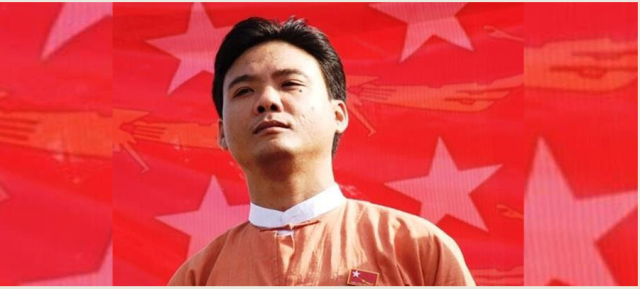
U Phyo Zeya Thaw (aka Zeya Thaw) is seen as an NLD candidate for the by-election in 2012. / Oakkar KoKo
For his fans, who are used to seeing him perform energetically onstage like your typical rapper, the picture that emerged last week was heartbreaking. His fellow lawmakers who once worked with him in Myanmar’s Parliament were similarly saddened by the image released by the regime.
In the picture, U Phyo Zeya Thaw is hardly recognizable as the hip-hop star-turned-parliamentarian they know. His face is visibly bruised by torture. He has been forced to kneel down, his hands cuffed behind his back. His hair—normally hidden under a traditional Myanmar turban while in Parliament, or a ball cap when on stage—is bushy. Normally clean shaven, he has a protruding mustache. The regime accused him of being among the leaders of the civilian guerrilla units in Yangon that carried out “terrorist activities” (its term for the struggle against the junta). The 40-year-old was arrested by junta forces during a raid on Nov. 18.
The regime has accused him of providing weapons to the resistance groups to attack junta targets, including regime-appointed administrators and security forces, among others, from May to early November.
U Phyo Zeya Thaw’s metamorphosis from hip-hop singer-cum-lawmaker to resistance leader took only a few months. It all started with a military coup on a fateful day in February.
‘Our cause must prevail’
More than 20 years after they introduced hip-hop music to Myanmar with their hit debut “Beginning,” the members of ACID—Zeya Thaw (U Phyo Zeya Thaw’s stage name), Yan Yan Chan, Anagga and featured singer R Zarni—were busy with their new album release, scheduled for the first week of February.
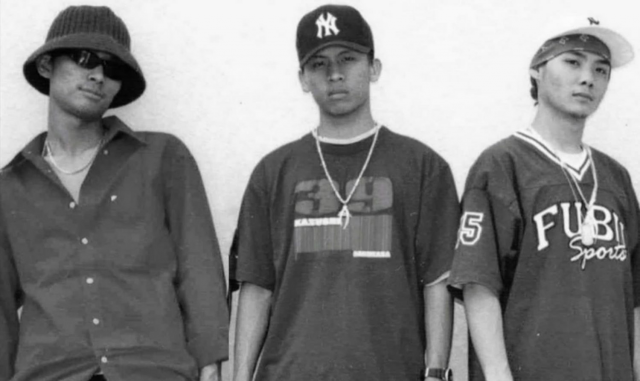
Featured singer R Zarni (left) and rappers Yan Yan Chan (center) and Zeya Thaw (right) in the early 2000s when they co-founded Myanmar’s first hip-hop band, ACID. / Yan Yan Chan
Like many others in Myanmar, their plans were turned upside down by the Feb. 1 coup.
Instead of working on the album launch, he and his friends took to the street to protest against the military, rejecting the coup and calling for the restoration of democracy. He said at the time that people had to show their opposition to the regime whatever the cost, because the coup threatened to destroy not only individuals’ hopes, but the future of the country.
“We take to the streets because we should. If we are all united, the regime will be gone soon. That’s what I believe and our cause must prevail,” he said while attending an anti-regime protest in downtown Yangon in early March. At the time the regime was intensifying its crackdown on protesters; before long it would shock the world with the utter brutality it was inflicting on its own people, including fatal shootings and mass arrests that would eventually force many protesters to take up arms. Many who were involved in the protests and lawmakers from the ousted National League for Democracy (NLD) went into hiding. As a member of both groups, U Phyo Zeya Thaw was among those who went to ground.
Then in April when the shadow National Unity Government (NUG) was formed, he made contact with some of his fellow lawmakers in the leadership. The regime claimed he was the NUG’s representative for Yangon and the leader of a Special Task Force and People’s Defense Force (PDF) group formed to carry out armed resistance against the junta.
An era of urban guerrilla warfare in Yangon had dawned.
Agent of change
U Phyo Zeya Thaw wears many hats.
Apart from being a rapper, lawmaker and now resistance leader, as claimed by the regime, he has been a social activist and is a former political prisoner.
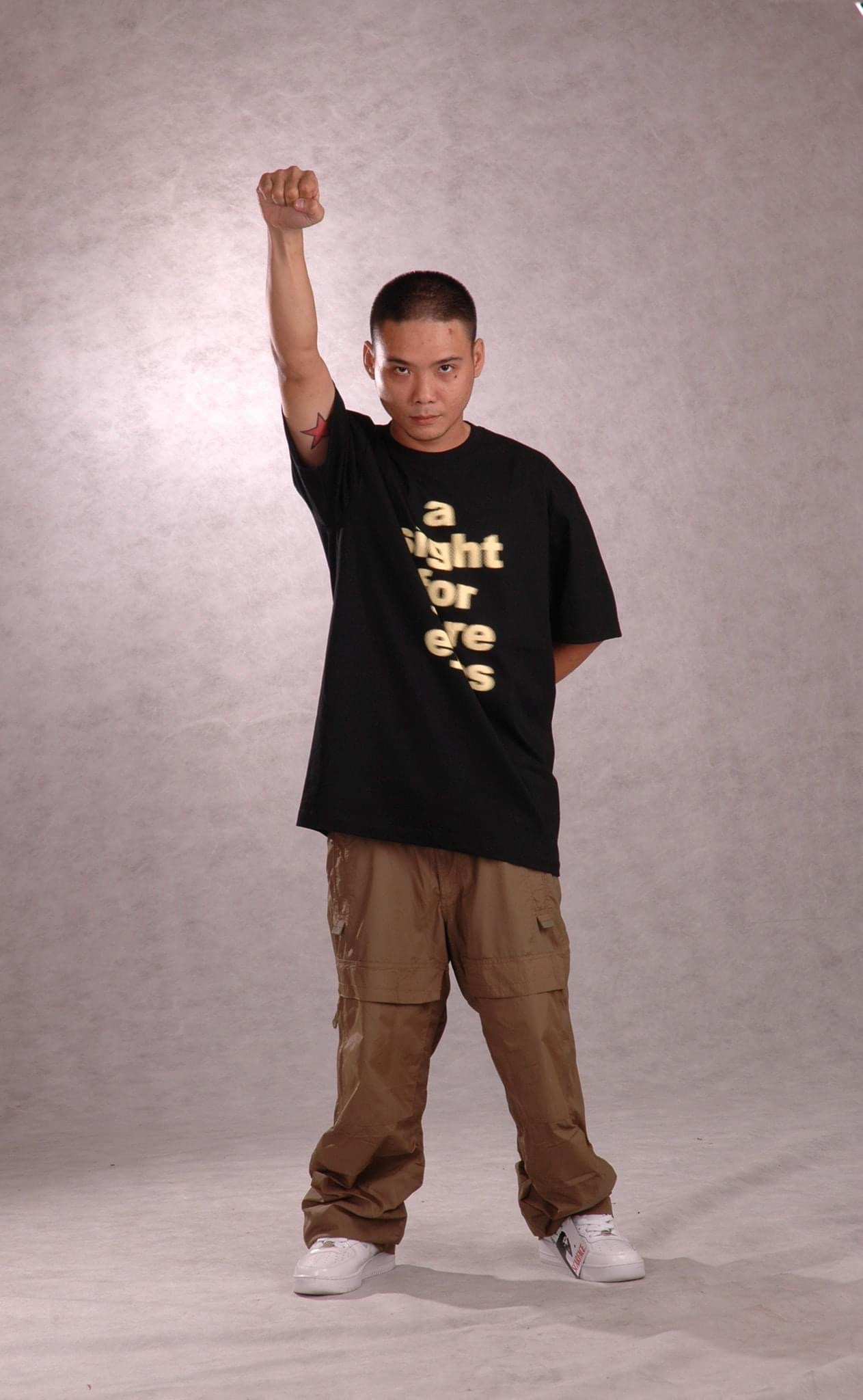
Undated picture of U Phyo Zeya Thaw. / Yan Yan Chan
Born in Yangon, he studied English at university.
In 2007, following the Saffron Revolution in September, he co-founded an underground youth organization, Generation Wave, known for using guerrilla tactics to distribute subversive material opposing the then junta. The following year, he was arrested and charged with forming an illegal organization and illegal possession of foreign currency, amounting to US$20. He was sentenced to six years’ imprisonment, an experience he later described as a period of “soul-searching.”
“Before that I was just an activist who rebelled against injustice. When I was in prison, I thought seriously about what I wanted to be: activist or politician. As I wanted to make changes [to end] injustice, I joined the NLD when I was free [in 2011],” he recalled in a 2019 interview with Radio Free Asia.
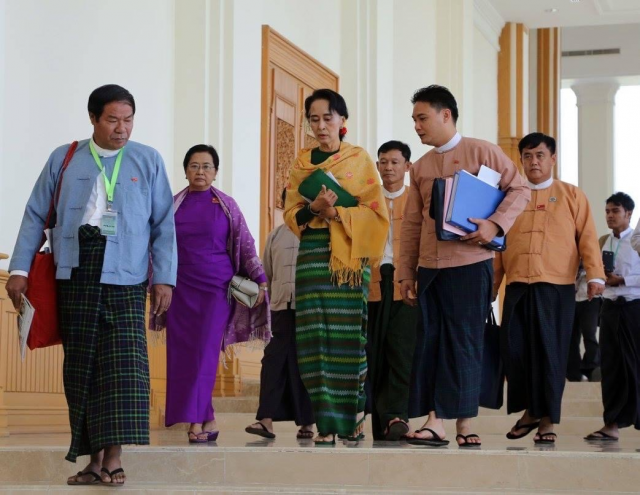
U Phyo Zeya Thaw (right) as an NLD lawmaker with party leader Daw Aung San Suu Kyi in Parliament in 2016. / NLD chairperson
NLD leader Daw Aung San Suu Kyi, who was trying to rejuvenate her party at the time, welcomed him into the fold, urging him not to let his sacrifices go in vain, saying the party and the country needed young people like him.
In the 2012 by-election he won a Lower House seat on the NLD ticket in Pobbathiri in Naypyitaw, beating his rival, former Lieutenant General Wai Lwin, an ex-defense minister.
He also joined a small entourage accompanying Daw Aung San Suu Kyi on a trip to Europe in the same year, visiting five countries including Norway, where she formally accepted the Nobel Prize that she had been unable to receive in 1991 as she was detained by Myanmar’s then junta at the time.
He won re-election in 2015, beating another former general, Myat Hein, of the NLD’s chief rival, the military proxy Union Solidarity and Development Party (USDP), in the capital’s Zabuthiri constituency. He was a member of two parliamentary committees and developed a reputation as a hard-working and passionate legislator who always educated himself deeply about the issues.
“He is very patient, detailed, hard-working and always keeps an eye on political changes,” said U Bo Bo Oo, a member of Parliament who worked with U Phyo Zeya Thaw on the Lower House Committee on International Relations from 2018-20.
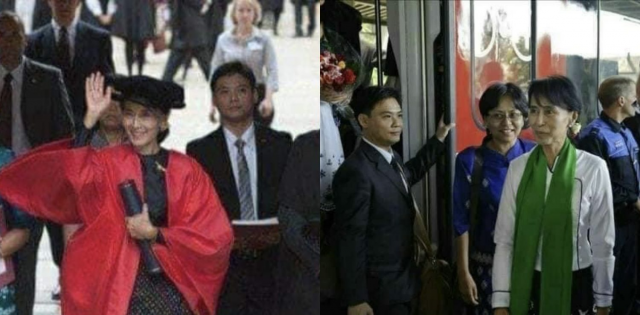
U Phyo Zeya Thaw joins a small entourage accompanying Daw Aung San Suu Kyi on her trip to Europe in 2012. / NLD chairperson
The former rapper didn’t contest the 2020 election as he wanted to return to his life as a musical artist.
After helping out with the 2020 November election campaign in Naypyitaw, he invested his time in music.
Close friend and fellow ACID member Yan Yan Chan said that in early February he and his ex-lawmaker friend were busy putting the final touches on their new album, which was scheduled to be released around that time. Then came the coup and his friend’s arrest.
“He is a determined person—determined in politics, as well as in music and whatever he does,” Yan Yan Chan told The Irrawaddy.
Singer R Zarni, a longtime friend of U Phyo Zeya Thaw, said everyone knows that he has sacrificed much for freedom and justice.
“We know more about our friend. He is a good man. We want him to be freed,” he said, following the news of U Phyo Zeya Thaw’s arrest.
Propaganda frenzy
In May, Yangon began to see occasional arson attacks and explosions against regime targets like local administrative offices and security checkpoints. Then came fatal close-range shootings of junta-appointed officials and deadly hit-and-run attacks on soldiers manning checkpoints. Local PDFs claimed responsibility for some of the attacks. The regime launched crackdowns on the resistance forces and made a series of arrests. They repeatedly claimed to have learned from detainees under interrogation that U Phyo Zeya Thaw was behind some of the attacks, and charged him under the counter-terrorism law. People worried aloud and prayed for his safety, knowing he would be inhumanely tortured if caught.
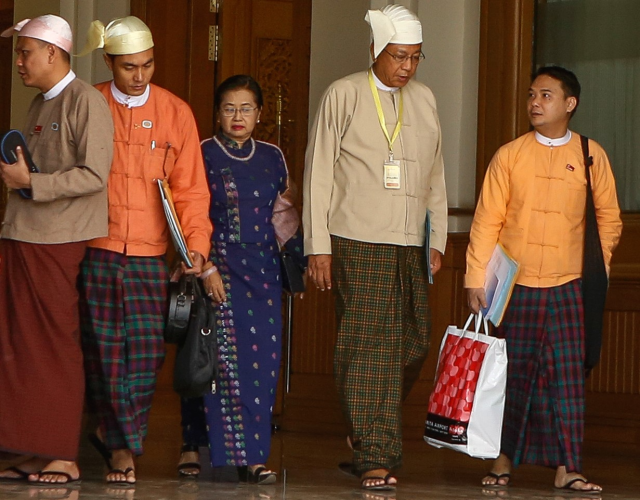
NLD lawmaker U Phyo Zeya Thaw (far right) with Myanmar’s then civilian President U Htin Kyaw in Parliament on March 18, 2016. / The Irrawaddy
Their prayers went unanswered, however; troops arrested U Phyo Zeya Thaw during a raid on a housing complex on the outskirts of Yangon last week.
Upon making the high-profile arrest, the regime launched a major propaganda campaign portraying the civilian resistance movement against them as having been rooted out. The previous month, they had arrested another well-known figure, Ko Jimmy, whom they accused of masterminding a major armed resistance operation in the city. Now, they had U Phyo Zeya Thaw. In an apparent attempt to demoralize those resistance forces still at large, they published and aired the picture of U Phyo Zeya Thaw taken after his arrest on a near daily basis in their newspapers and on their TV channels, with followup news reports on related arrests and weapons seizures. They claimed on Monday that he supplied guns and ammunition for “15 destructive missions” in Yangon, detailing the dates and locations of the incidents. When they aired the news on military-owned Myawady TV, they used pictures of Daw Aung San Suu Kyi and U Phyo Zeya Thaw taken together, probably in 2012. Many saw it as a personal attack on both.
For all their claims of victory in the newspapers and on TV, however, the streets of Yangon are a testament to the regime’s ongoing concern about the PDFs. Corner checkpoints are now heavily fortified with more sandbags than before. Gun-toting soldiers with bewildered looks treat every passerby with suspicion, as they have learned from previous incidents that the barrel of an M-16 could suddenly appear at any moment, trained on them from an approaching car.
More importantly, while the frequency of the attacks on regime targets has declined following the recent arrests, many believe it would be hugely difficult for the junta to track down all PDF members active in Yangon. While some are under the NUG’s command, there are many others who are loosely organized and operate independently scattered across the city. They could still pose a threat to the regime, even with small-scale attacks carried out whenever the chance permits.
Meanwhile, U Phyo Zeya Thaw is undergoing the regime’s gruesome interrogations and will surely be slapped with a series of charges and face, at the very least, lengthy sentences.
His fellow lawmaker U Bo Bo Oo said that while it was no longer strange to hear of such arrests in the country, where the military has violently and arbitrarily arrested hundreds of pro-democracy activists, he was especially saddened to learn of his colleague’s detention.
“Ko Zeya Thaw symbolizes the many young people who have reacted against violent military oppression,” he said.
On the day of Zeya Thaw’s arrest, his bandmate Yan Yan Chan wrote on Facebook: “This is not the first time for you. I believe you could get through it, dude!”
Original Post: The Irrawaddy

